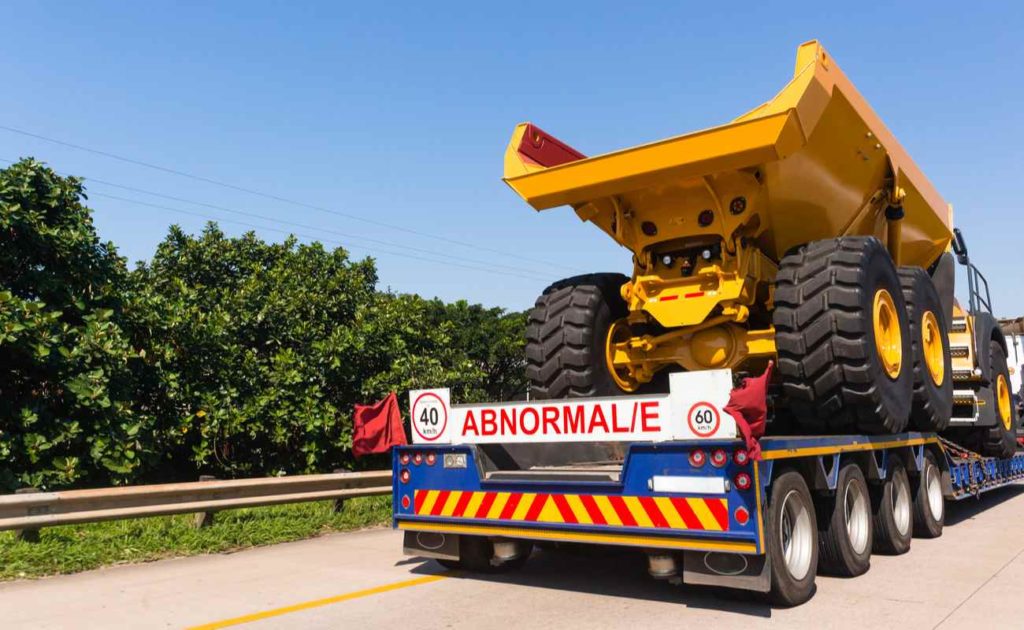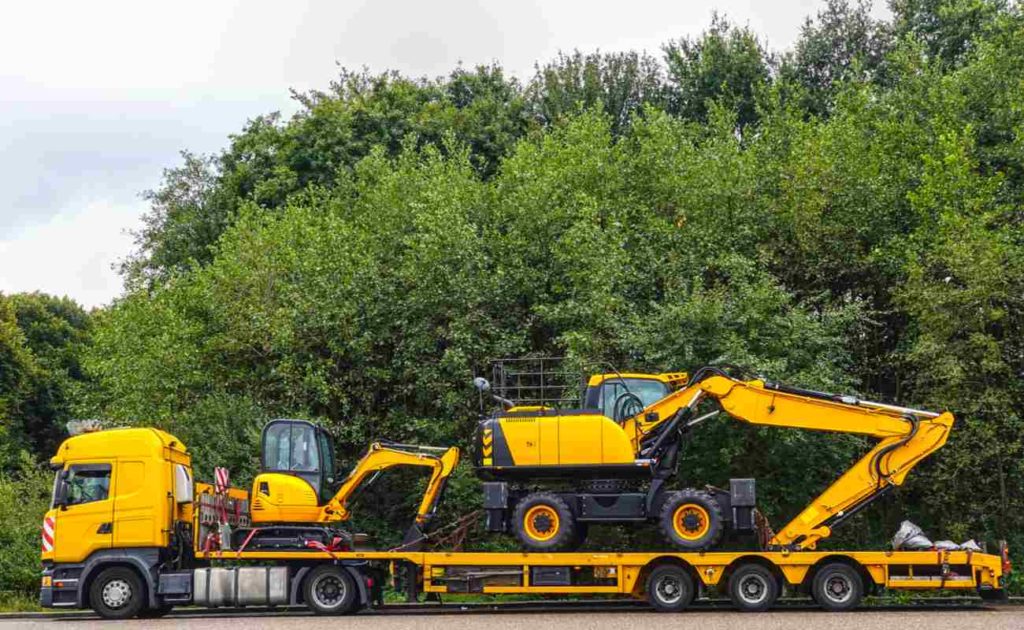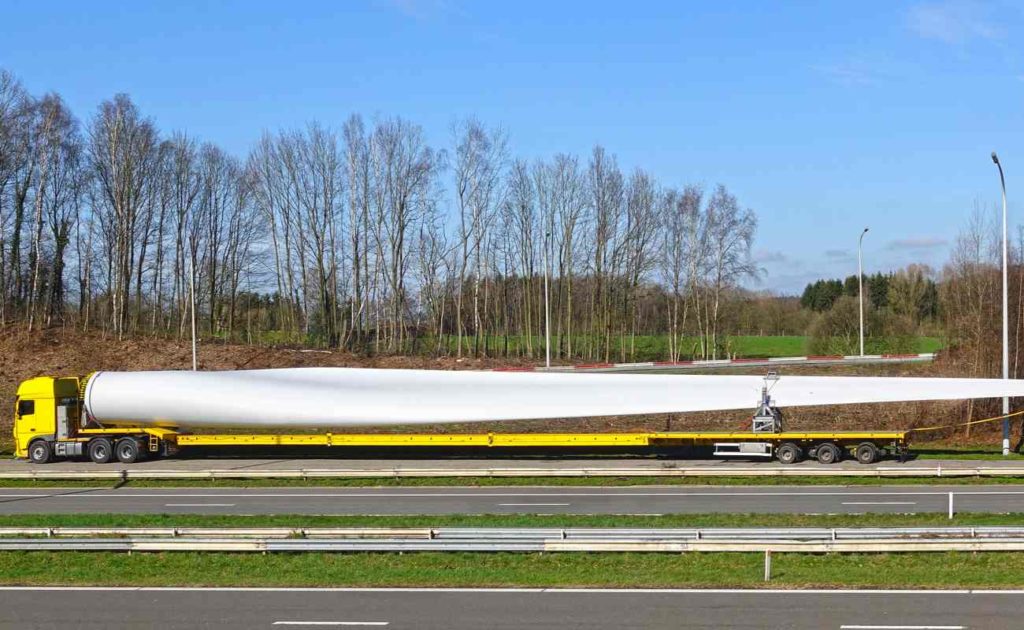Abnormal load transportation by road is subject to a number of regulations. Overloading a vehicle is illegal and can lead to expensive fines and even prosecution in certain cases. We explain what an abnormal load is, abnormal load regulations in the UK, and types of trailers best suited to abnormal load haulage on UK roads.
Where possible, a load should always be divided up and transported within the legal weight limits, but there are times when this just isn’t possible. An aircraft wing, for instance, is an abnormal indivisible load and cannot be reasonably disassembled for transportation and is, therefore subject to wide load regulations. An increasing number of extraordinarily heavy or out-sized items must be transported by road for abnormal load haulage, from military ordnance and crane ballast to mobile homes and construction equipment.
In these cases, the trailer or truck used to take abnormal indivisible loads by road is subject to regulations to make transportation possible while keeping road infrastructure and other road users safe from potential harm or damage.
Abnormal Load Regulations UK

Wondering about Wide load regulations in the UK? The Road Vehicles (Construction & Use) Regulations 1986 and the Road Vehicles (Authorised Weight) Regulations 1998 regulate the weights and dimensions of all vehicles used on British roads, including Heavy Goods Vehicles (HGV).
The maximum width for road transport is strict. Vehicles that do not meet Construction & Use and Authorised Weight regulations are called Special Types Vehicles (STVs). They may still be used outside these rules under the authority of the Road Vehicles (Authorisation of Special Types) (General) Order 2003 (STGO). Still, to comply, they must have an STGO order issued by Highways England and the Vehicle Certification Agency (VCA).
- If the gross weight of a vehicle carrying a load exceeds Construction & Use limits up to 80,000 kg, or 78.74 tonnes – two clear days’ notice is required with an indemnity to Road and Bridge Authorities. (“Clear days’ notice” excludes Saturdays, Sundays or public holidays in any part of Great Britain.)
- If the gross weight of a vehicle carrying a load exceeds 80,000 kg up to 150,000 kgs or 147.63 tonnes – two clear days’ notice to police is required and five clear days with indemnity to Road and Bridge Authorities.
- When the gross weight of a vehicle carrying a load exceeds 150,000 kg, or 147.63 tonnes – a Highways England Special Order is required, as well as five clear days’ notice to police and five clear days’ notice with indemnity to Road and Bridge Authorities. (Keep in mind that issuing a Highways England Special Order is always at the discretion of the Highways England abnormal loads team acting on behalf of the Secretary of State for Transport. Highways England advises applicants to request abnormal load permission at least ten weeks before their scheduled transportation date or even at the pre-tender stage before making a financial commitment to supply a load.)
- When a load exceeds Construction & Use load regulation widths of 2.9 m (or 9 feet 6 inches) up to 4.3 m (or 14 feet 1 inch) or STGO loads exceed a width of 3 m (or 9 feet 10 inches) up to 5 m (or 16 feet 5 inches) – two clear days’ notice to police is required.
- If a load width exceeds 5 m (16 feet 5 inches) up to 6.1 m (or 20 feet) – a Highways England form VR1 is required in addition to two clear days’ notice to the police. (Since approval is not automatic, Highways England advises that applicants should apply for abnormal load permission at least two weeks before the date of a scheduled move.)
- Even though there is no statutory limit governing the overall height of a load when applying for a Special Order or VR1, it should, wherever possible, not exceed 4.95 m (or 16 feet 3 inches) – this is so maximum use can be made of the motorway and trunk road network.
- If a load width exceeds 6.1 m (or 20 feet) – a Highways England Special Order, as well as five clear days’ notice to police and five clear days’ notice with indemnity to Road and Bridge Authorities, are required.
- When Construction & Use loads exceed 18.65 m (or 61 feet 2 inches) up to 27.4 m (or 90 feet) in length, and STGO loads exceed 18.75 m (or 61 feet 6 inches in length) – two clear days’ notice to police is required.
- If the overall length of a part two-vehicle combination exceeds 25.9 m (or 85 feet) – two clear days’ notice to the police is needed.
- When the maximum length exceeds 30 m (or 98 feet 5 inches), a Highways England Special Order is required in addition to five clear days’ notice to police and five clear days’ notice with indemnity to Road and Bridge Authorities.
- For some very light loads, like yacht masts, for instance, that are moved on conventional motor vehicles not exceeding 12 tonnes gross weight or trailers not exceeding 10 tonnes gross weight – a Highways England Special Order is required if the rigid length exceeds 27.4 m (or 89 feet 11 inches).
- Application to move Special Types or Special Purpose vehicles (like large agricultural vehicles that may not be fully permitted by Construction & Use regulations or fall outside the scope of the Special Types General Order) should be made to the Vehicle Certification Agency (VCA).
Notify the correct authorities
By law, those transporting an abnormal load must inform the police, highway authorities and, if necessary, bridge and structure owners along the route that they intend to move an abnormal load. You can do this by filling in an abnormal loads movement application form, or you can use Highways England’s electronic service delivery for abnormal loads (ESDAL) to plan your route and receive advance notice of any potential problems along the way, save your vehicle details and passages for future planning, and inform the authorities of your abnormal load movements around the road network. Begin this process early to give yourself enough time – usually ten weeks – to get clearances from the police, highway, and bridge authorities.
Abnormal load transportation
When an enforcement officer stops an abnormal load, they will check that the correct procedure for abnormal load transport has been followed, that the vehicle or its cargo has been marked and that the weight, height, and width do not exceed the thresholds recorded in the abnormal load order.
Types of trailers suited to abnormal loads

Abnormal loads typically do not fit into a curtain-side trailer. Many abnormal loads can be transported on a ramped or flatbed trailer and low loader trailers. Depending on your move and load, specialist trailers may be needed. You may also need vehicles for an escorted load on part of the journey or throughout.
The low bed trailer, in particular, has been designed with abnormal load transport in mind and is favoured by many abnormal load transport companies. There are many new and used trailers for sale in the trailer sales UK market.
Asset Alliance Group Truck and Trailer Sales is the largest independent retailer of new trailers, nearly new and second-hand trailers in the UK. Our expertise extends beyond commercial vehicle sales – to servicing, repair, refurbishment, customisation and stacking for export – all from our on-site facilities across three locations, including workshops and the UK’s longest VOSA-authorised testing facility.
Types of abnormal load trailers for sale include the fixed gooseneck trailer. This trailer offers an increased deck length for out-sized loads, and its lightweight design, low-profile tyres and typical drop ramp make it especially suitable for heavy lifting. Fixed-neck models offer the same benefits without loading flexibility, although the hydraulic detachable gooseneck is an option.
Flatbed trailers can be used for abnormal loads because their flat ‘bed’ with no sides or roof allow for transporting large and heavy loads that would not fit into a typical closed-body trailer. Extended flatbed trailers of up to 29.7 m (or 98 feet) are also available on the market for long loads.

Trailers for sale through trusted UK experts
We put to work all the considerable experience and industry knowledge of the Asset Alliance Group Truck and Trailer sales staff to ensure our customers feel confident in the value and quality of our new truck trailers for sale and our second-hand trailers for sale.
As true asset management specialists, we are not only involved in commercial vehicle leasing and providing a range of flexible truck finance packages – we also purchase, refinance and procure for our clients. We can buy your assets outright and tailor monthly contracts to suit your needs.
If you want new or used trucks for sale in the UK or would like to refinance your used trailers and trucks, please contact the team at Asset Alliance Group. We would be delighted to discuss how we can help.

